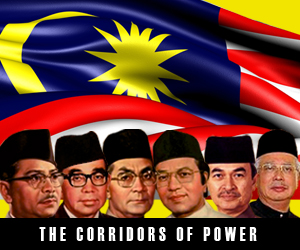And if we say ‘yes’ to a referendum on the Sedition Act, what justification is there to say ‘no’ for the other referendums as well, just like Scotland did a referendum on whether to remain in Great Britain and Australia on whether the Queen of England should also be Australia’s Monarch?
THE CORRIDORS OF POWER
Raja Petra Kamarudin
Prime Minister Najib Tun Razak’s announcement at the recent Umno General Assembly regarding the Sedition Act took many by surprise. Some are saying that a referendum should be held as to whether therakyat do really want the Sedition Act to be retained or whether they would rather it be repealed.
Unfortunately, Malaysia does not have a culture of referendums and even if we wanted to do one would we not first have to pass a new law in Parliament to make the outcome or result of the referendum legally binding? If not it would have the same legal status as an opinion poll.
Furthermore, Malaysians do not trust the country’s electoral process so would they honour and accept the outcome or result of the referendum or would they organise ‘Blackout’ rallies and allege that the government cheated in the referendum exercise by bringing in 40,000 Bangladeshi voters?
Okay, say Parliament passes a law that stipulates referendums are legally binding, and say the Election Commission (SPR) introduces electoral reforms that guarantee the electoral process is clean, why should the referendum only be about the Sedition Act?
Sabah and Sarawak will now want a referendum held to see whether Sabahans and Sarawakians still want their two states to remain in Malaysia or to follow Singapore’s example and gain independence?
Kelantan and Penang may also want the same thing, especially Kelantan, which wants the state to be an Islamic State with Hudud as the laws of the land (while an independent Penang will be a carbon-copy of Singapore in time to come).
Terengganu, too, would be better off as an independent state because of its oil and gas wealth. As an independent state it would get all the revenue instead of just 5% like now.
And if we say ‘yes’ to a referendum on the Sedition Act, what justification is there to say ‘no’ for the other referendums as well, just like Scotland did a referendum on whether to remain in Great Britain and Australia on whether the Queen of England should also be Australia’s Monarch?
In short, why is the Sedition Act important enough for a referendum to be held but the others are not? To the people of Sabah, Sarawak, Penang and Kelantan, and even Terengganu, the referendum on whether to stay in Malaysia is far more important than the referendum on the Sedition Act.
And what about a referendum on whether gay marriages should be allowed? Shouldn’t this be held as well and if not then why not? What gives the government the right to decide whom I can or cannot sleep with? Just because the Bible or the Qur’an says so then I must follow it? But what if I am an atheist and do not believe in God or the so-called Holy Books? Why should I live my life according to what I do not believe?
Yes, there are many things that are decided on our behalf and which we have no say in the matter and have to accept it even if we do not agree with it. But then that is the system we agreed on. We agreed that Malaysia would have a Westminster system of Parliament and a government that is elected based on the first-past-the-post (FPTP) system where those that win the majority seats and not those that win the majority votes get to form the government.
It is what many would call a democracy. And have I not said many times that a democracy is not the best form of government, especially the British system that we are using? But then that is the system that we adopted and we now have to live with it unless we want to change that system to something else.
The system that we are using is the representative system of government, not the direct vote system of government. Hence we do not vote in Parliament (or the State Assemblies). We elect representatives to do that for us. So they vote on our behalf. And we have no control on how they vote.
If we are not happy with our representatives then we kick them out and replace them. But that can only be done in the general elections. Until then we are stuck with them.
However, one problem with this is, come the general election we do not really care who these representatives are or what they stand for. We vote for the party they represent, not for what theyrepresent.
For example, they may be a Christian or Muslim who believes in the Bible or Qur’an and hence believe that homosexuality is an affront to their religion. We, however, may be a libertarian and believe in freedom of choice. But we still vote for them even though they are anti-gay because of the party platform they stand on and even though we do not support their anti-gay stand.
That is the reality of the situation. And then when laws are passed that sends convicted gays to jail for 20 years we grumble and complain when it is our fault.



No comments:
Post a Comment
Note: Only a member of this blog may post a comment.